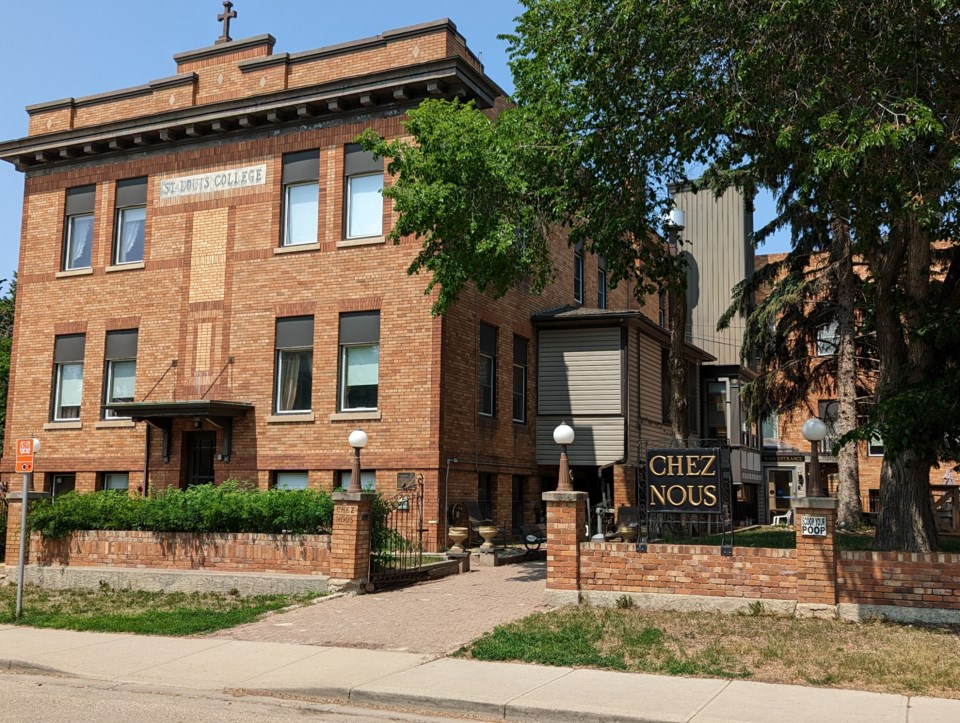MOOSE JAW — A proposal to turn the former Chez Nous Care Home into an on-site supportive housing venue that offers programming to families and individuals is acceptable under the current bylaw, city hall says.
The Ranch Ehrlo Society submitted a development and building permit application on May 22, asking to change the use of the former Chez Nous building at 1101 Grafton Avenue, a July 14 city council report said.
The non-profit organization explained the work it wanted to perform in the building — located in the R3 high-density residential district — by transforming the 50 single-room suites into 23 multi-room suites that consist of 16 three-bedroom suites, five two-bedroom suites and two treatment/support suites, the document continued.
Ranch Ehrlo plans to run programs that support 16 families, with 16 employees on site throughout the day, while it will provide 24/7 support to families, the report said.
“The applicant has confirmed that (it) will not be a medical treatment facility, but will employ two nurses to enhance supports for some family members who experience detoxification and withdrawal symptoms,” the document noted.
While the non-profit will offer supportive programming in those two areas, it will also offer initiatives focused on parenting support, nutrition, life skills coaching, employment support and cultural and spiritual services, the report continued. Also, Ranch Ehrlo’s goal is to support families working toward reunification and/or stabilization.
“They aim to enhance overall family functioning, ultimately helping families transition to independent living,” the document added.
Meanwhile, city administration reviewed the proposal and determined that it aligned with the Official Community Plan and the supportive housing definition in the zoning bylaw, the report said. Furthermore, the R3 district permits supportive housing, and as a permitted use, the city does not require extra public engagement activities, although it does encourage the applicant to fulfill those processes.
City hall provided a conditional development permit to Ranch Ehrlo, as long as the non-profit met the parking requirements of one space per three units, the report continued. Ranch Ehrlo indicated that it would continue to maintain existing shared parking with adjacent property owners.
The report pointed out that council altered the definition of supportive housing in 2019 after adopting an updated zoning bylaw. The amendments included “housekeeping updates” to improve clarity and consistency across the bylaw, including a revised definition of supportive housing.
However, since the city’s planning public notice policy had not yet come into effect — that came in 2021 — administration announced the changes in the Moose Jaw Express and on the city’s website, the document said. City hall only issued notices about the bylaw amendments to properties in districts that were most affected, such as those in floodway and heritage overlay districts.
The bylaw’s updated definition of “supportive housing” included that the operator must still be a non-profit or public authority, that the housing must remain residential, and that the new language aligns with contemporary human services terminology while still conforming to the bylaw’s broader residential use framework, the report continued.
While this amendment included a wider definitional range of “persons having special needs” and support services, “this proposed project would have met the requirements under both the previous and current definitions,” the city said.
Furthermore, redefining “supportive housing” did not change the land-use category, zoning district or development process, while the use remained permitted in those zones, the report continued.
“The city’s continued administration of supportive housing under the current zoning framework remains lawful, appropriate and consistent with both provincial planning legislation and human rights obligations,” the document added.
The next regular council meeting is Monday, July 28.




